News & Media
Mlambo-Ngcuka: ‘Not just women’s rights—rights for all
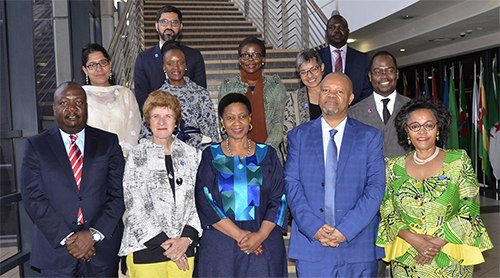
Flanking Dr Phumzile Mlambo-Ngcuka (Executive Director: UN Women) (centre) are Dr Tawanda Mutasah (Senior Director: Amnesty International), Kate Gilmore (Deputy High Commissioner for Human Rights, UN), Prof Mandla Makhanya (Principal and Vice-Chancellor: Unisa), and Nardos Bekele-Thomas (Resident Coordinator: UN in South Africa). Behind them are other invited guests.
Two major milestones—Unisa’s 145thanniversary as a beacon of hope and the 70thanniversary of the Universal Declaration of Human Rights—shared the stage on 15 August 2018 when the institution hosted an event themed ‘Supporting social movements and civil society activism to leave no one behind for peace, prosperity and sustainable development’.
Taking place during Women’s Month, the event was jointly organised by Unisa, United Nations (UN) Women, the Office of the UN High Commissioner for Human Rights, Amnesty International, the Nelson Mandela Foundation, and the Government of South Africa.
The responsibility is ours
In his welcome address, Prof Mandla Makhanya, Unisa Principal and Vice-Chancellor, said it is now the turn of ‘we, the people’ to move forward as a collective in addressing the grave challenges faced by South Africa and the continent, and, in a direct sense, our own families. “It is our families who are bearing the brunt of the collapse of mainly male-dominated institutions that is affecting the very core of who we are,” he said.
The VC said that he was awed by the list of participants at the event. ‘I have seldom seen such a diverse, yet comprehensive list of speakers and participants, representing such an array of organisations, institutions, structures, and formations, all of whom are gathered together to advance prosperity and sustainable development,” he said. “One perceives in this list and in the audience, a deliberate intention to tap into the reservoirs of our intellectual knowledge, capacities and capabilities on the one hand, and a willingness to step up and say: ‘Mr President, Thuma Mina,’ on the other.”
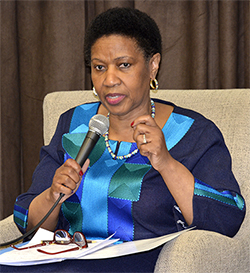
Lead speaker Dr Phumzile Mlambo-Ngcuka (Executive Director: UN Women) said that she was inspired by the large number of young women attending the event, and their intensity and passion.
Fighting all of the battles at the same time
Dr Phumzile Mlambo-Ngcuka, Executive Director of UN Women, reflected on the intersectional role of activism in the context of the human rights landscape. She said that intersectionality is critical. “You cannot be a feminist, and at the same time homophobic and racist. You have to be on the side of human rights across the board. When we talk about the world that people like Albertina Sisulu and Madiba dreamt of, it means fighting all of these battles, all at the same time.
“This is why UN Women does not focus solely on women. Although there is no country in the world where women’s rights were realised without a strong women’s movement, that in itself is not enough. You need to ensure that disability rights are respected, and so, too, children’s rights. In especially South Africa right now we do not have the luxury of being divided.”
Mlambo-Ngcuka said that we are living in a particularly sombre era because of the contradiction of having one of the world’s best constitutions but also many unkept promises. “The level of gender-based violence that we are experiencing is not what the new South Africa promised. We must make sure that this will not last for the rest of our lives. This is why millions of young women decided to take the matter into their own hands, and participate in the #TotalShutdown campaign on 1 August this year. My hope is that when we find ourselves at the end of Women’s Month, we will have identified ways to move forward. A heartening development as a result of the TotalShutdown Intersectional Women’s March Against Gender-based Violence is that the national gender summit requested by the women has been granted.” Audience members greeted this last statement with loud applause.
Other main themes discussed during the day were the Universal Declaration of Human Rights and the Constitution of South Africa as frameworks for safeguarding the expansion of the democratic civic space, women’s rights to land ownership in South Africa, and ensuring that no one is left behind in the South African land reform process. The skilled moderators ensured that audience members were engaged throughout, resulting in true conversation rather than one-way oratory.
Speaking towards the end of the programme, Trudi Makhaya, economic advisor to the President of South Africa, said that her hope was that women’s economic empowerment would avoid the pitfalls that hindered black economic empowerment. “Concrete action in the form of implementation over the short term of the very laudable strategic objectives will be key,” she said. “It is essential to get things moving.”
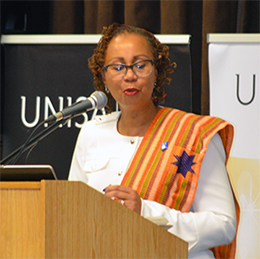
Programme director Anne Githuku-Shongwe (UN Women in South Africa) energetically managed the proceedings with infectious humour. |
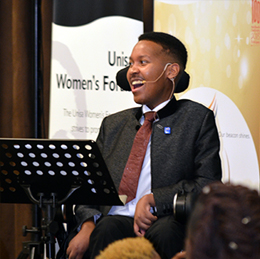
The inspirational Edward Ndopu, who has set his sights on space travel, moderated a conversation on civic action, youth and social movements. |
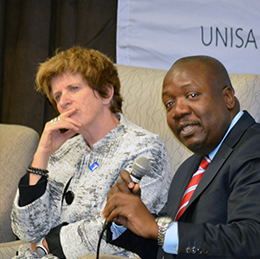
Kate Gilmore (Deputy High Commissioner for Human Rights, UN) and Dr Tawanda Mutasah (Senior Director: Amnesty International) provided insightful commentary from the perspective of their organisations. |
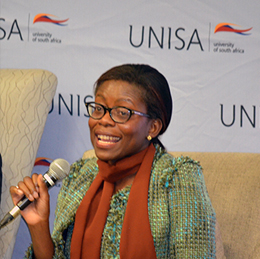
Kate Gilmore (Deputy High Commissioner for Human Rights, UN) and Dr Tawanda Mutasah (Senior Director: Amnesty International) provided insightful commentary from the perspective of their organisations. |
*By Philip van der Merwe
Publish date: 2018-08-17 00:00:00.0

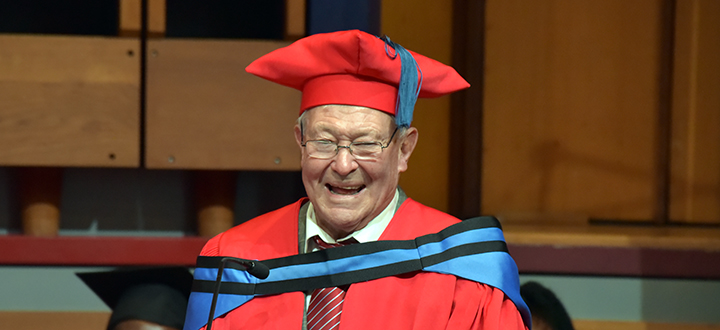 Community champion and agricultural entrepreneur extraordinaire honoured by Unisa
Community champion and agricultural entrepreneur extraordinaire honoured by Unisa
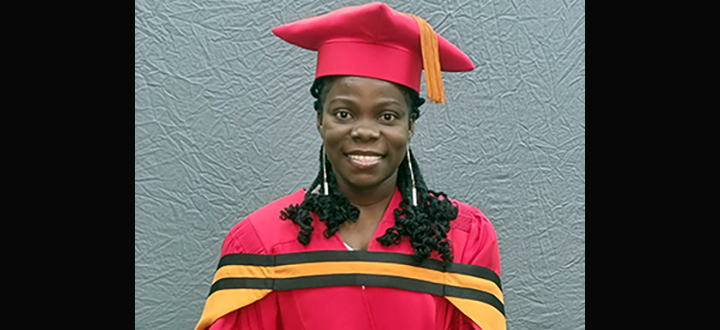 Ghanaian-born Swede earns PhD in Information Sciences from Unisa
Ghanaian-born Swede earns PhD in Information Sciences from Unisa
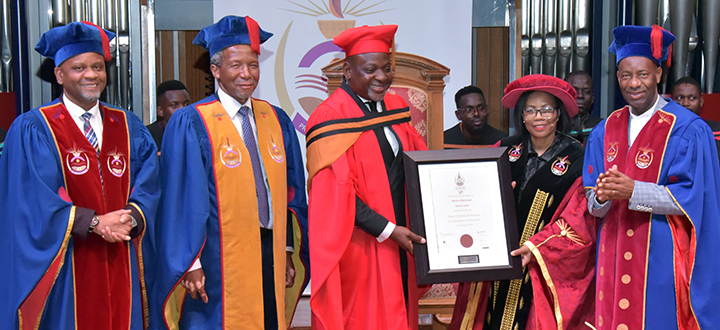 Unisa awards honorary doctorate to exemplary philanthropist and entrepreneur Collen Tshifhiwa Mashawana
Unisa awards honorary doctorate to exemplary philanthropist and entrepreneur Collen Tshifhiwa Mashawana
 Inhlanyelo Hub explores financing and sustainability at the International Conference on Business Incubation
Inhlanyelo Hub explores financing and sustainability at the International Conference on Business Incubation
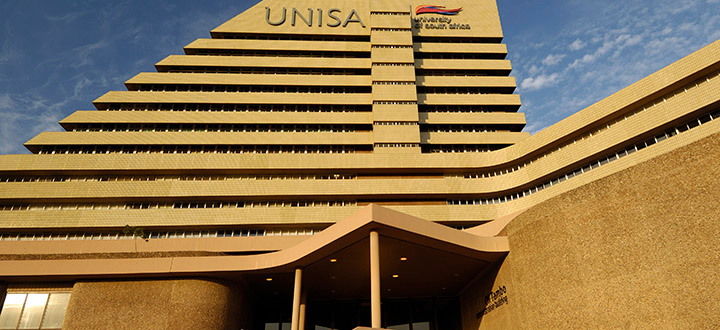 Unisa remains anchored among the waves
Unisa remains anchored among the waves